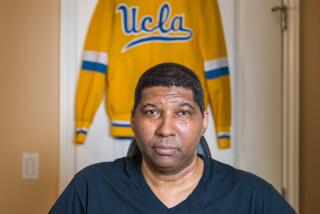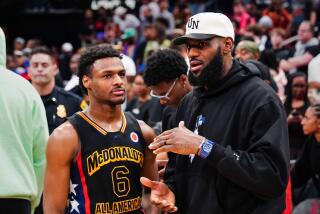Trying Times : John Flowers, Who Was to Play Basketball for CS Northridge, Struggles to Recover From an Accident That Claimed Both of His Legs, at Times Living the Game Through Others
John Flowers spends his afternoons at a basketball court. That part has not changed.
The net still dances when he swishes a jump shot. The rim still rattles after he throws down a thunderous dunk.
His body cannot perform as it used to, but when Flowers hears the squeal of sneakers pressed against hardwood and the banter among players, not even his wheelchair can confine him.
He imagines that he, too, is out on the floor, running, shooting and jumping.
This is his therapy. And also his anguish.
Flowers was a promising college basketball prospect, a 6-foot-4 swingman with the moves of an acrobat and the mind of a magician. In April, he became the first out-of-state basketball player ever to accept a scholarship to Cal State Northridge.
For a third-year Division I program on a tight budget, his signing was a landmark occasion. At Northridge, tuition for students from outside the state is six times as high as it is for California residents.
Flowers, who averaged 16.4 points for Phoenix College, a community college in Arizona, was said to be well worth the investment.
Then tragedy changed everything.
Flowers survived a car accident in Kansas City on Aug. 10 that claimed the life of his stepbrother, Tony, and a close family friend. But his injuries led to five operations, the eventual loss of both legs, and, ultimately, the end of a dream.
“All I ever wanted to do was play basketball,” Flowers said.
He still does. But only in his mind.
Since returning home to the Phoenix suburb of Glendale after a 39-day stay at Truman Medical Center in Kansas City, Flowers, 21, has become a regular visitor to the gymnasium at Glendale Community College.
Most days, he is driven to the team’s basketball practice by Chris Johnson, a friend and former high school teammate. But Johnson, his best friend since junior high, is not the player Flowers watches most intently. Instead, his focus usually is on Mark Brown, a powerful 6-3 sophomore forward and Glendale’s best player.
“Watching Mark is tough on John,” said Glendale Coach Mike Warren, who coached Flowers at Phoenix Tolleson High. “Mark is big, strong and very explosive around the basket. Sometimes when he gets a dunk during practice or a game, you can see John’s eyes light up.”
Other times, when a play seems all too familiar, Flowers is compelled to turn away.
“I look at him and I see me,” Flowers said. “It’s tough.”
For the most part, however, he seems to enjoy staying close to his favorite game. Warren said Flowers pays special attention to the team’s reserves, often offering tips and encouragement.
His courageous outlook has been a pleasant surprise. His friends had feared the worst.
Troy Hudson, the coach at Phoenix College, recalled Flowers being teased mercilessly for tipping over when he got caught on a step trying casually to back his wheelchair out of his family’s home.
“He was laughing right along with everyone else,” Hudson said. “He has been very positive and upbeat.”
Asked about the incident, Flowers laughed softly and quipped, “I got caught being a little too cool.”
There are, however, difficult times, when tears flow freely in waves of emotion.
“He has been incredibly strong, but he’s human,” Johnson said. “He gets down, especially when he’s alone and he has time to think.
“John is very proud and he likes to do things for himself. It bothers him when he feels like he’s a burden to people.”
Being deprived of his independence, Flowers said, is worse than losing his ability to play basketball. So he strives mightily to again become self-sufficient.
Three times a week, Flowers attends hourlong rehabilitation sessions at Good Samaritan Medical Center in Phoenix, where he is learning how to walk using prostheses, step by arduous step.
He begins by moving between parallel metal bars that extend for about 10 feet, a length Flowers might have covered in one dynamic swoop on the basketball floor. Now it takes him as many as a dozen deliberate steps.
Flowers wears a black T-shirt and red shorts, which hang loosely around his once-muscular thighs. His bandaged stubs are tucked into the cups of the protheses. Below them are artificial joints--hinges that connect the cups to metal rods that serve as his shins.
“It’s kind of like walking on stilts,” Flowers said, managing a smile.
He painstakingly shuffles the length of the bars several times. After a short rest, he is shown how to use his crutches to help himself out of his wheelchair.
The session concludes with Flowers up on his crutches, navigating the hallways of the hospital with the help of two physical therapists.
“He is very motivated, which is half the battle,” said Janine Passkiewicz, the lead therapist. “He’s making real quick progress, but how fast and how far he goes depends a lot on his goals.”
Flowers is strong, willing and used to the discipline of training. “It seems natural for me to go into something and expect to work hard,” he said. “That’s all I know how to do.”
For his father, the effort is not easy to witness.
“I feel a lot of sorrow,” John Sr. said. “There’s always that question, why? I guess sometimes that is not for us to ask.”
The accident happened only a week before Flowers had planned on leaving for Northridge. He was in Kansas City on vacation, visiting his grandparents.
Flowers, his stepbrother and his stepbrother’s girlfriend, Kim Turner, were returning home from a late-night sojourn with friends when the crash occurred. Flowers was in the back seat. The two others, sitting in front, were killed instantly, Flowers said, after a van struck them from behind and their car skidded into a utility pole.
The last image Flowers recalls before the impact was the outline of the pole looming larger as the car slid off the road. He covered his head.
“The next thing I knew, I was up and sticking out of the car,” he said.
The impact had lifted him through the back window.
Flowers doesn’t remember experiencing pain until he tried to disengage himself from a tangled web of metal and glass.
“When I went to look for my brother, I tried to pick myself up,” he said. “That’s when I felt the pain.”
A bystander tried to help pull him from the wreckage, but it was no use.
In the distance, Flowers could hear sirens.
“It seemed like they were taking forever to get there,” he said.
He remained wedged between the car and the pole for 45 minutes, until firemen using metal cutters finally freed him.
As he was lifted onto a gurney, Flowers recalls hearing a paramedic say, “His leg, it’s just barely hanging there.”
After that, he passed out.
At Truman Medical Center in Kansas City, Flowers was taken into surgery, where he remained for 12 hours.
It was not until two days later that he was coherent enough to ask his father about his condition.
Flowers was not aware that his right leg had been amputated at mid-shin. Even after being told, he said, “I didn’t realize until almost a week later that my leg was really gone.”
His legs had been his wings. Quickness and jumping ability were the traits that made him special as an athlete. But he still had hope, which was buoyed by a visit from Chris Lindley, a former University of Kansas basketball player.
Lindley had been a patient in the same hospital two years earlier, when he lost his right foot in a train accident. Lindley offered encouragement and, most importantly, an example.
“You couldn’t even really tell,” Flowers said. “He was walking perfect. I saw him and said, ‘I can come back, just like him.’ ”
Bill Demby also called. He is a double-amputee who received considerable acclaim for his appearance as a basketball player in a television commercial.
Flowers envisioned one day being able to perform much like Demby’s character, who deftly outplayed his opponents in the commercial.
The doctors were more cautious.
“They told us he had a 50-50 chance with his other leg,” John Sr. said. “But you take that and hold on to it. You don’t want to hear the rest.”
Unfortunately, they had no choice. Blood stopped flowing in the remaining lower portion of his right leg, forcing amputation above the knee. Then, two weeks later, his left leg became infected by gangrene and it, too, required amputation at the thigh.
“It was like he was losing bits and pieces of himself,” said Warren, who flew to Kansas City to see Flowers.
For more than a month, Flowers rode an emotional roller coaster.
“He kept getting his hopes up,” Johnson said. “Then something else would happen and they would take more away.”
But his interest in basketball never subsided.
Late in September, when Flowers finally returned home, one of his first tasks was to find a homemade video entitled “John” and slip it into the family’s player.
The six-minute production is a basketball highlight video of Flowers in vintage form. For six minutes, he lofts three-point baskets or, when the defense extends too far, explosively dribbles in for a dunk.
Flowers used the video as a tool in selling himself to four-year schools. The attributes he displayed solidified the opinion of Northridge coaches.
“John could do a lot of things,” Northridge Coach Pete Cassidy said. “We expected him to be a very key player for us.”
Though he will never suit up for the Matadors, he has not been forgotten. On Saturday, Northridge plays its home opener against Cal State Fullerton. Cassidy personally is paying for Flowers and his father to fly in to attend the game.
“They wanted him as a player, but they also care for him as a person,” John Sr. said.
The invitation was extended, Cassidy said, to let Flowers know he is always welcome at the school.
“We want to support him any way we can,” Cassidy said.
Flowers has found it difficult keeping tabs on the Matadors because Phoenix newspapers don’t routinely print the scores of Northridge games. He does, however, recall a bond he established with guards Andre Chevalier and James Morris on his recruiting visit.
“They’re nice guys,” Flowers said. “I felt comfortable there.”
In fact, Northridge still is his college of choice.
Cassidy hopes that, through donations, Flowers might still be able to attend Northridge once he regains his independence. There also is the matter of paying mounting hospital bills, rehabilitation costs and for the $35,000 protheses that have been ordered for him. Insurance is covering most, but not all, of the expenses.
Flowers is scheduled to arrive in Los Angeles on Saturday morning and be at Northridge in time to attend a Saturday afternoon shoot-around.
He knows he might be asked to take part.
A few weeks ago, he might have declined.
“I had this thing in my mind,” he said. “If I couldn’t play the right way, I didn’t want to play. People said, ‘You can still play wheelchair basketball . . .’ It’s not the same.
“I was thinking, ‘If I get a breakaway layup, I don’t want to just lay it up.’ I haven’t made a layup on a breakaway since my sophomore year in high school.”
Before, he could always dunk.
But lately he has changed his mind.
“I might take a few shots,” Flowers said. “I can still do that.”
More to Read
Get our high school sports newsletter
Prep Rally is devoted to the SoCal high school sports experience, bringing you scores, stories and a behind-the-scenes look at what makes prep sports so popular.
You may occasionally receive promotional content from the Los Angeles Times.







